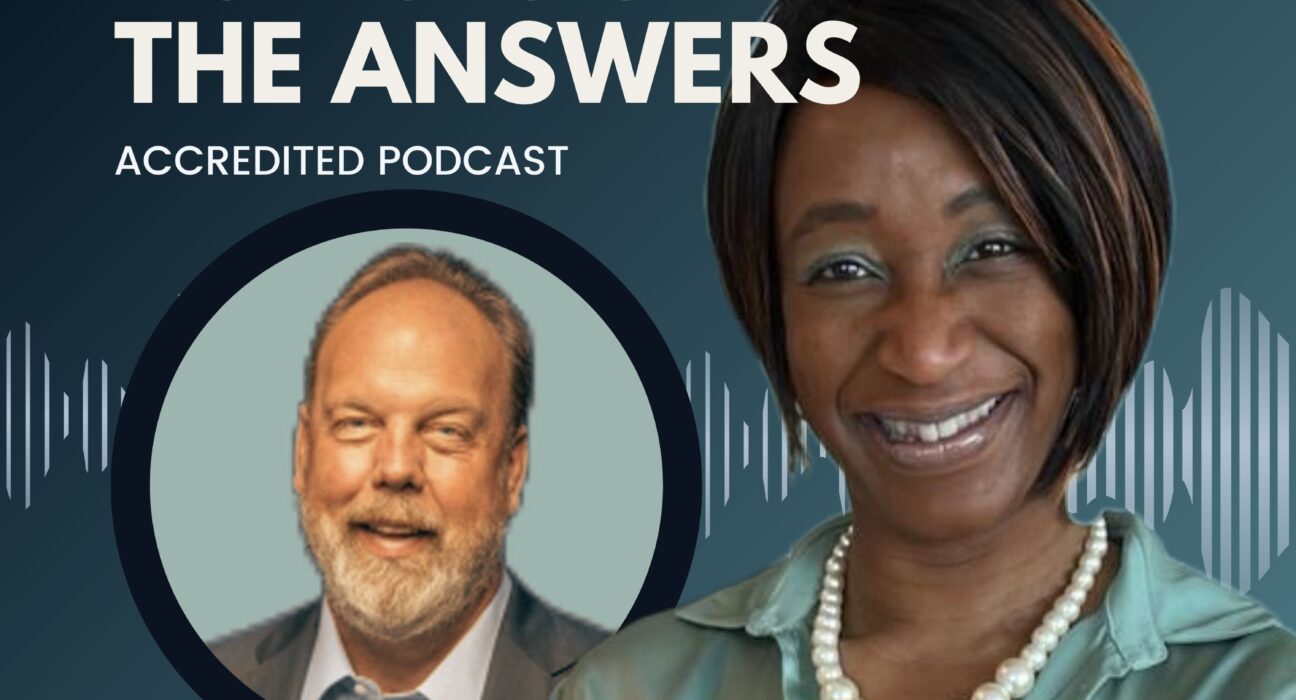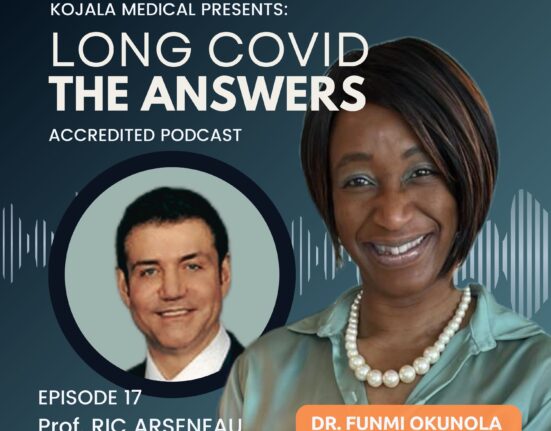
Prof. Jim Jackson discusses the value of Acceptance and Commitment Therapy (ACT) in managing mental health, particularly for Long COVID patients. He highlights the role of mindfulness, cognitive diffusion, and post-traumatic growth, emphasizing that suffering can be transformative, and support groups offer crucial community and encouragement for recovery.
Guest – Professor Jim Jackson
Note: The podcast has no bias. All conflicts of interest are highlighted with individual guests.
Healthcare Professionals | Earn 0.5 Certified Mainpro+® Credits! Please register/login to claim your CPD/ CEU credits.
Podcast Overview:
Prof Jim Jackson emphasizes the transformative power of Acceptance and Commitment Therapy (ACT) for Long COVID patients, focusing on mindfulness, cognitive diffusion, and post-traumatic growth. He highlights the importance of support groups in fostering recovery through community and shared experiences.
Highlights:
- Transformative potential of suffering
- Key ACT components: mindfulness, cognitive diffusion
- Emphasis on post-traumatic growth
- Value of support groups for Long COVID patients
DISCLAIMER: The information in this podcast is provided for informational purposes only. You should not use any information discussed in this podcast and related materials to make medical or healthcare related decisions. Always consult a your physician or other qualified health care provider with regards to diagnosing managing your medical condition. Any medications or treatments, including any discussed in this podcast, should be initiated and managed by a qualified health care professional.
Podcast Transcript:
Healthcare Professionals: Please note to claim Certified CPD / CEU credits toward your medical license (Canada & reciprocal CPD/CEU Worldwide), you will need to register or log in.
Episode 11 – The Psychological Management of Mental Health in Long COVID ft. Professor Jim Jackson
[00:00:00] Funmi Okunola: The information in this podcast is provided for informational purposes only. You should not use any information discussed in this podcast and related materials to make medical or healthcare related decisions. Always consult your physician or other qualified healthcare provider with regards to diagnosing and managing your medical condition. Any medications or treatments, including any discussed in this podcast should be initiated and managed by a qualified healthcare professional.
Funmi Okunola: Welcome to Long COVID – The Answers. Today’s Episode is part of our series about the neurological impact of Long COVID. We will talk about the psychological management of mental illness in Long COVID. I’d like to introduce Professor James Jackson. Professor Jackson is an internationally renowned expert on Long COVID and its effects on cognitive and mental health functioning.
A licensed psychologist specializing in neuropsychology and cognitive rehabilitation, he completed his [00:01:00] psychology residency at the Veteran Affairs Vanderbilt University School of Consortium in Nashville, Tennessee in the USA, and received post-doctoral training in cognitive rehabilitation at the Oliver Zangwell Centre in Ely, Cambridgeshire, England.
He is a research professor of medicine and psychiatry at Vanderbilt where he is also the co-founder and director of behavioral health at the ICU Recovery Centre, devoted to diagnosing and treating survivors of both mild and critical illness, including those who survived COVID-19. Welcome, Jim.
Jim Jackson: So good to be here. I truly believe there’s no place right now where I’d rather be than having this conversation. So, thank you for inviting me.
Funmi Okunola: Oh, thank you. Jim. Do you have any conflicts of interest to declare?
Jim Jackson: I have no conflicts to declare.
Funmi Okunola: So, most of the questions in this podcast are based around Professor Jackson’s book, “Clearing the Fog”, which is frankly excellent [00:02:00] and a book I highly recommend.
As I said before, it’s one of the guides alongside the Long COVID Handbook by Gez Medinger and Danny Altman that goes a long way to making sense of the confusion around managing Long COVID. I must add that I have no financial gain for this endorsement. Firstly, Jim, can you please explain the difference between a neuropsychologist and a psychiatrist?
Jim Jackson: There’s a big difference and a series of key differences. I’m glad to engage those. To start, psychiatrists are medical doctors. They’ve gone to medical school, and they are skilled and typically very thoughtful. But the primary part of their expertise is pharmacologic, they prescribe medications.
They often do so very well, and they diagnose mental illnesses of various kinds. Psychiatrists do. Neuropsychologists are trained as psychologists. However, they do something that is a [00:03:00] little bit different than what medical doctors do. It’s not better or worse, but it’s different, and that is they do cognitive testing.
They do psychological testing of various kinds using complicated measures to try to characterize cognitive impairment, PTSD, OCD, a range of challenges. The tools of the trade are a little bit different than those of psychiatrists. Their training is quite different. They often both play a complementary role, but they have very different niches.
Funmi Okunola: Yeah, I thought it was really important to ask that question because both professionals are called doctor very often. People get really confused about the roles and who they’re seeing.
Jim Jackson: They do, and if medication is needed, a neuropsychologist is the last person you want to see. It’s not true. I mean, they’re not the last person. One thing they can often do is help a patient determine perhaps who they need to see – whether [00:04:00] they need to see a psychiatrist or not, but if medication in particular is the challenge and for many of our patients, psychiatric medications can be hugely beneficial, a psychiatrist is really the expert.
There are a lot of family practitioners who prescribe medications for depression and anxiety, OCD, sometimes even other severe forms of mental illness, and they can do that very effectively. The content experts in that space though really are psychiatrists.
Funmi Okunola: Thank you. Could you please talk about the different mental health conditions that occur with Long COVID and what symptoms doctors and Long COVID sufferers should look out for?
Jim Jackson: It’s a complicated conversation – mental health challenges along with COVID for a couple of reasons. One is that often when patients disclose that they are struggling, disclose to their doctors that they’re struggling with anxiety or [00:05:00] depression, too often that leads to a scenario where the doctor says, “Aha! I knew it! It’s just anxiety, right? It’s just depression”, and if a patient hears that, or if they think they hear that, typically what they do is they retreat. They’re really reluctant now to endorse any mental health symptoms at all because they feel like their physical symptoms are being diminished or demeaned perhaps.
So, it’s really complicated. We have to be really thoughtful about it. But be that as it may, we do see mental health conditions commonly in people with Long COVID, and I would add why wouldn’t we – like often their health is ruined and their finances are wrecked and they’re living in their parent’s house or they’re living in their car.
You know, they’re one check away from being homeless. So, of course they’re struggling with depression, of course they’re struggling with anxiety. Not infrequently they’re struggling with OCD. Frequently they struggle with PTSD. There’s a [00:06:00] lot of debate among academics about whether getting COVID is a traumatic event or not. To me that is like the scholastics of old arguing about how many angels could fit on the head of a pin.
It’s not really a relevant argument. It’s not a helpful conversation. If you talk to people with Long COVID, despite being at an academic ivory tower and having some definition of trauma, you will walk away being convinced, I think, that they’ve been very traumatized. So, we see PTSD again, OCD, anxiety, depression.
Those are the four primary things in a subset of people, small but not none, we see the onset of new psychotic symptoms. Again, this is rare, but we do see it. It’s particularly terrifying when we see it. People developing delusions and sometimes hearing voices, hallucinating – perhaps the thing that is the most frightening of all of them, but also the [00:07:00] least frequent.
Funmi Okunola: Excellent answer. Thank you. How does this differ from the increase in mental health disorders seen amongst people during the pandemic as a whole? By that, how does the mental health disorder in Long COVID differ from the increase we’ve seen generally in society?
Jim Jackson: I understand the question, and it’s a good question. I think it’s a little bit hard and maybe a little artificial to separate these completely because people who develop Long COVID – they lived through the pandemic also, so the same general cultural Zeitgeist, the fear and the malaise and the shocking nature of how surreal it was, the isolation that affected them too before they got COVID. It affected them after they got COVID. I think probably it is the case that these cultural dynamics amplify. They may have even created some vulnerabilities for people who are [00:08:00] already anxious because this is an anxious moment in history.
Now I’ve got Long COVID, and that anxiety I had is now exacerbated a little bit. So, I think teasing them out completely, trying to figure out what is due to what completely is challenging and maybe a little bit artificial. I do know that for many people, Long COVID is a key driver of their anxiety, a key driver of their depression, their OCD.
One way you can tell the relationship, the cause and effect is timing. If I had no anxiety at all, and then right on the heels of getting COVID my anxiety is profound, profound. How do you explain it? If I had no OCD at all, and a week after getting COVID I’ve got severe OCD, it’s Occam’s razor. The simplest solution is probably the most likely one. We interact a lot with [00:09:00] insurance companies. We interact a lot with disability carriers. They have a skepticism about this that is, to my mind, not well founded. It’s a little bit silly. Of course, people who develop COVID, if they have ongoing symptoms and brand new medical problems, of course that is going to be reflected in mental health problems. How could it not be?
Funmi Okunola: Yeah, and I think we’re seeing the tip of the iceberg, really, of Long Haulers. I think everybody knows someone. When you just start to peel back the onion and ask people a few questions, you find that they often have one, two, three colleagues, some family members who have Long COVID symptoms, and I think the insurance companies and the disability organizations are very reluctant to acknowledge it because they foresee a tsunami and maybe going bankrupt.
Jim Jackson: Yeah. I’m a very even keeled guy by nature, and I don’t get angry very much, but I did a peer to peer review [00:10:00] recently where you talk about a patient to a doctor who works for an insurance company who is evaluating a claim about disability, whatever, and I got so angry, I have to say, I got so angry at what I perceived to be their recalcitrance and their unwillingness to look at the facts objectively. I think there’s a lot of skepticism and is partly why I think it behooves you and I and all of us in positions of some power, at least some power, it behooves us to be a voice for the voiceless. Really to be an advocate for people who cannot advocate for themselves, and I very much see that as part of my mission. If we believe, because I think it’s true that millions of people with Long COVID have cognitive impairment, if we believe because it’s true that they’re fatigued that they have anxiety and depression, that puts them into quite a difficult spot when it comes to advocating for [00:11:00] themselves.
They’re not as equipped to do that as they were before. They’re just not, and the gauntlet has been laid down. We have to take it up, I think, and advocate for them as much as we can. If we don’t do it, nobody is going to, and then that’s really going to be a problem.
Funmi Okunola: Definitely. I wholeheartedly agree with you there. So, Jim, what’s your own approach as a psychologist to treating mental illness in Long Haulers?
Jim Jackson: There are a variety of approaches that people use depending a little bit perhaps on how well delineated a condition is if you have very discreet obvious PTSD. There are PTSD specific approaches certainly that people use. They’re outlined in my book. But the overarching approach that I like to use is something called “acceptance and commitment therapy” – that’s ACT for short – ACT.
My relationship with ACT is complicated and really lovely, and that is in [00:12:00] 2018 I developed OCD quite out of the blue. I described this in the book, and I thought it was going to ruin my life. I thought I had ruined my life. I went to see a psychologist, a great clinician here in Nashville, and I said, “let’s get rid of this. I’m tired of this”, and she said – I don’t think she laughed, she might have been laughing internally, but she said “Jim, we don’t just get rid of it. You learn to live with it”, and I was really unhappy I have to say with that answer. I was really frustrated by that because my own approach was other people can live with things like this – I’m not living with this, we’re fixing it.
So, we set about to fix it. But ironically, paradoxically the way to fix it really was to accept it. It was accepted, and she taught me to accept it through the use of something called “acceptance and commitment therapy”, and there’s a lot more to acceptance and commitment therapy than just acceptance. But suffice it to say, ACT is [00:13:00] built on the premise that we don’t have to change something to be okay. We can instead find a way to change our relationship with it. Meaning, I don’t have to change my OCD necessarily. It’d be great if I could, but I can change my relationship with my OCD. I can learn to notice it instead of being consumed by it. I can learn to treat it in some ways as a friend rather than an enemy. I can change my relationship with it, and in the process, I can learn to do really hard things. This is the essence, I think, of ACT, and so often this is important.
Often in the early days of the pandemic we have patients come to us, come to see me, and they basically said this. They said, “if I can get rid of my Long COVID, I’m going to be fine, and if I can’t get rid of my Long COVID, nothing is ever going to be okay”. That’s a very [00:14:00] difficult way to frame things – a little bit hopeless, I think, because what if it doesn’t get better? What if it doesn’t go away? So, the message grounded in acceptance commitment therapy is we hope you’re going to be fine, but we don’t have to wait for you to be fine.
We don’t have to wait for your symptoms to go away for you to be fine. We can help you find a way to live a meaningful life, even if your symptoms never go away. We had a patient in our support group recently. She was talking about the vagaries and nuances of Long COVID, and she said something really interesting. She said, “Long COVID saved my life”, and I got up, sat up. Like what do you mean by that?
What she meant by that was that the job she had been working at, that she got fired from by the way due to Long COVID, that job had been killing her. The unbalanced lifestyle she had been living before Long COVID that had been killing her. The priorities that she embraced before Long COVID, those had been killing her, and in a strange twist of irony, Long COVID was saving [00:15:00] her. It’s very lovely. It’s very moving. It’s a different way to think about things, and ACT opens up those sorts of doors.
Funmi Okunola: Could you give another example? Because I’m thinking when people are very depressed or very anxious, it can be so debilitating. So how would ACT work in those ways?
Jim Jackson: Sure, whether it would be with depression or anxiety a lot of ACT would be focused on helping people to notice those things, and to find a way to learn to live with them. That might be as basic as the idea that, again, my depression doesn’t have to go away for this to be okay.
Noticing and mindfulness. These are key components of ACT. The idea that I am not my thoughts. This is one key aspect of ACT. There’s something called “cognitive diffusion”. Cognitive diffusion is where you learn that your anxious [00:16:00] thoughts are what they are, but you learn to create some distance between you and them. They’re just thoughts. They’re not facts. They’re just thoughts. You notice, you develop the ability to follow anxious thoughts as they move across the horizon, to not get hooked by them. We teach patients things called unhooking strategies. Unhooking strategies. At the end of the day am I going to have these depressive thoughts. I’m going to have these anxious thoughts. I’m not going to be captured by them. I’m going to notice them. I’m going to move on. I’m going to pursue my values, whatever they are – not going to let my depression get me down.
It’s not quite as simple as I’m describing. I think in the famous movie, the Shawshank Redemption, there’s a line as I recall. I might mangle it. “You’re either getting on with the business of living or getting on with the business of dying”. Some version of that. So, we don’t have to figure out ACT. We don’t have to figure out the root cause. We don’t have to pull it out like a [00:17:00] plant from the ground before we can begin to engage depression.
We’re encouraging people to get on with the business of living even if that depression is present, and the business of living involves pursuing your values, pursuing meaning, even if the depression is still there, and over time, that leads to transformation.
Funmi Okunola: Hmm, it sounds very similar to cognitive behavioral therapy. What’s the difference between ACT and CBT?
Jim Jackson: Yeah. It is what is called the third wave of the cognitive behavioral therapy. So, it’s a modification of CBT. It’s a little less cognitive in nature. It’s a little more philosophical. For instance, in ACT there is a strong emphasis on the idea that suffering in life is inevitable, that you can find value in suffering, that you can be transformed by suffering. That philosophical angle, probably Eastern or Buddhist, perhaps in origin. [00:18:00] Yeah, Buddhist. That’s not really a tenant of CBT per se, and that’s partly what I like about ACT, that it has a philosophical grounding. I think we’ve done people a disservice in modern medicine, if you want to think of it that way, by suggesting to them that we can have a solution for everything, here’s a pill that you can take, it’ll be all better, you can go to the doctor, they’ll fix you up. It’s just fine. I think sometimes that reinforces in people that’s the cure. The cure is, well for some people, the cure may be learning to live with something that never goes away.
When you do that, if you can do that, you crack the code. If I can learn to live with my OCD and live a rich and full life, even if it never goes away, the OCD has lost his hold on me. For Barbara, the lovely woman that I’m talking about here who said, “Long COVID has saved my [00:19:00] life”, in some important ways Long COVID has lost its hold on her. She’s no longer hooked by Long COVID. She’s suffering in certain ways. Yes, her life is challenging in many ways. Yes, and her life has been remarkably enriched by the changes that have come with Long COVID. So, I think it’s possible this isn’t all rainbows and unicorns. This isn’t all philosophical fluff. We see in the lives of real patients, real improvement when they learn to accept things, embrace the narrative as it is as opposed to the way they want it to be. People start to transform when this happens.
Funmi Okunola: I have a feeling that Long COVID is going to completely transform our attitudes to practice in medicine. Mainly in the fact that I never really thought about post viral illness until this pandemic.
We had an interview last week with Rick Arseneau who is a Professor of internal medicine. He specializes in [00:20:00] treating complex diseases, namely Fibromyalgia, ME/CFS, and Long COVID. He talks about how childhood trauma or some form of trauma can actually precipitate these things and cause a biochemical change, pathological change in the body to give symptoms of ME/CFS. What do you think about that?
Jim Jackson: No, I agree with that. I couldn’t agree more, and I’m really encouraged that finally in March of 2024 it looks like we’re starting to get some traction with regard to randomized trials with regard to high science.
If you want to call it that we have a large, randomized trial here at Vanderbilt that is about to launch funded by the National Institute of Aging called RVLC reverse Long COVID, and in this study we’re testing an immunomodulator baricitinib, and we’re exploring whether that can improve cognition in our Long COVID patients.
We will see – it might, it might not. There’s a huge amount of interest in that topic, but I think [00:21:00] finally we are seeing some of the fruit of the efforts that people have gone into writing grants and now they’ve been funded. Now we’re starting to enroll patients. So, I think we’re going to see some good things, and I think we’re going to recognize, as you noted, that there is tremendous complexity to this and that there are dimensions and dynamics that we might not have appreciated.
One of them you mentioned was trauma. Lifetime history of trauma predisposes people, but more than that, has its own biology, if you will. Same thing probably with repeated head injuries perhaps that were minor. There are a lot of minor insults that perhaps were not so minor, and I think what’s important I’m not a basic scientist, I’m not a clinical trialist, but I think what’s important to say to patients in the realm of ACT is we want you to pursue these treatments. We want you to do it aggressively. We want you to be the very best consumer you can of the best health care you can. [00:22:00] But we want to remind you that, even if you’re not in a clinical trial, even if that clinical trial doesn’t work, even if this moonshot that you were hoping would cure your problems doesn’t work, there’s still a way to function and even to thrive, and that is partly with the help of some of these Buddhist inspired insights that we referenced, which are suffering has some value, difficulty has some value, living in community with other people has some value, learning to rewrite your narrative in a way that is more empowering that has some value.
Funmi Okunola: Fantastic. Could you please talk about post traumatic growth?
Jim Jackson: I’ll mention it really quickly. You told me earlier that you were a country music fan. I love it that you are, and in Nashville where I’m coming from tonight, we love singers. Yes, but we love songwriters even more. I do at least run into them occasionally, and they’re like rock stars to me. I know a few of them, and there’s a songwriter, Tim [00:23:00] Nichols. He wrote “Live Like You’re Dying”, a famous song that Tim McGraw sang, if you remember it. I think it was Tim Nichols along with a songwriter Wiseman, last name Wiseman.
Anyway, “Live Like You’re Dying”. This song is about a man who gets cancer, and he realizes his life is short, and he realizes that understanding now the brevity of his life, he’s going to pursue things that are newly important to him. He’s going to become a bit of a different person. He’s going to value relationships more than he did.
The song’s lovely in the way it describes these things. Craig Wiseman. Anyway, that paradigm “live like you’re dying” is something that we genuinely see in some of our Long COVID patients where they feel like the trauma they endured and the struggle they had with it, more so the struggle they had with it, has been transformative to them. It has changed them in beautiful [00:24:00] ways. We really see it. So, if the question is do we want to immerse you in the deep end of the trauma pool so we can make you kinder and gentler? No one would want to do that, of course not. But, if that can be a by-product of everything you’ve endured, that would be really lovely.
So, we’re all about looking for points at which we can help foster and nurture. We see a lot of growth in people and in many of our patients we see that and when we see it, it reminds me that the hard work we’re doing and have been doing since the start of the pandemic, that it’s all worth it. It reminds me of what a privilege it is really to do this work.
Funmi Okunola: That’s great. We need to clone you Jim really. Can you please tell us about your Long COVID support groups.
Jim Jackson: Yeah, we had a support group, long before COVID started and [00:25:00] that group was for ICU survivors. They would drive to Vanderbilt, and we would meet in person. It was really powerful. We saw a lot of transformation in this group, and when the pandemic started and we started seeing people with Long COVID, I think I was not so surprised and others I think were not surprised either because I’ve been working in this medical cognitive space and I appreciated, I think, that sometimes pretty mild medical insults can lead to pretty big imprints in the lives of people.
So, I felt like there was going to be a problem and a need, and because we had a reputation for leading support groups of medical patients people started seeking us out. really was that easy and suggesting that we put up a sign or hang up a shingle and, we didn’t have to work very hard at that. People just started coming in the way that is highlighted in the famous movie Field of Dreams where there’s the line “If you build it, [00:26:00] they will come”. People just started coming, and we had one support group, a peer support group, and then we had another, and then we had another and another.
Today we have many. There were twenty-five people in a group that we led just yesterday, and there’s a waiting list of fifty or sixty people at any one time. The support groups do a couple things. They give people an opportunity to tell their story, and the value of that alone, I think, needs to not be understated – telling your story.
More than that, though, I think it gives people a rich community where they can relate to others and not feel as alone. Often people with Long COVID receive a lot of support from their family or friends for a month or two months or maybe three months. It’s not really different than the elderly man or woman at church who loses a spouse and people bring a casserole every day for a week or [00:27:00] two, and then six months later they’re forgotten. Sadly, this is a story of a lot of people with Long COVID where eventually their support systems get frayed, and they get tired, and people stop coming by, and friends choose other priorities. They feel so alone.
So, this dynamic of creating a loving community where people challenge each other, where they nurture each other, it’s really important. We know from psychology that there are two ingredients that are critical for growth, and they exist dynamically. Those two ingredients are high challenge and high support. When those go together, if you have a son or daughter, that would be hey, I’m expecting you to get really good grades, and I’m going to provide you all the support you need. It’s going to be really hard. I’ve got high expectations, but I’ve got big support, so in these support groups, we have high challenge. High challenge is you can do more than you think you can. You can take that trip to Hawaii with [00:28:00] your wife that you’ve been planning for years, even though you’re on oxygen, you can do it. We believe in you. You can do it. High challenge and high support, and when we wed those together people really change in the process and it’s transformative. I’m really proud of these support groups we’ve started.
Funmi Okunola: Oh, that’s great. Can you enlighten the family physician on an approach to diagnosing and treating mental health in Long COVID because family physicians deal with about ninety-six percent of mental health illness.
Jim Jackson: They do, and the ones that I know at Vanderbilt, people like, Eve Bowers and Sapna Kripalani, I’m not sure they’re going to listen to this podcast, but if they do, it’s a good opportunity for me to affirm them.
The ones I work with are so excellent and there’s so many great ones around the country who are overwhelmed by the need frankly. I think family physicians have different levels of comfort with diagnosing, but I think it [00:29:00] is made easier through the use of short and simple objective tools.
Those might be things like the GAD 7, the generalized anxiety disorder seven scale. Things like the HADS made famous in the United Kingdom. The Hospital Anxiety and Depression Scale. The IES Revised. The Impact of Events Scale Revised, or the Post Traumatic Stress Disorder Checklist.
These are things that are easy to learn. When primary care providers use them appropriately, I think they provide really useful answers. Now, having identified someone with depression, with anxiety or PTSD, OCD is a little harder, I think, but having identified someone with one of those three, it invites the same question that we discussed with cognition, which is “What do I do about it now? Do I reflexively prescribe medication as a first line approach? Do I try to find a therapist? If I try to find a therapist, where on earth will I find them? They all have waiting [00:30:00] lists”.
Those are complicated conversations, but I think diagnosing the problem can often be done quite accurately with those screening tools. At least those screening tools are going to put you on the path of making a referral to a more definitive specialist who himself or herself can be the one to say, “this isn’t just depression. This is major depression, or this isn’t just anxiety. This is actually OCD”. But it starts with a screening tool setting.
Funmi Okunola: How can friends and relatives provide support for Long Haulers with mental health symptoms?
Jim Jackson: The most important thing that friends and family can do I think are two things. One, they can realize that this is not as is commonly said in her head, in his head. I wish we could banish that expression. I think it’s so unhelpful when they are grappling with depression, anxiety, PTSD, whatever. Please, for once, please, please [00:31:00] let’s stop informing them, mans-plaining to them that this is just in your head. You’re actually not depressed, it’s just in your head.
Two, I think asking them what kind of support they need and providing it. What can I do for you? That’s something that we often don’t ask.
Three, creating an environment at home or at work where we are not stigmatizing mental illness, where that’s treated the same as the physical illness that isn’t stigmatized. People are not stigmatizing you if you have to fill in the blank, whatever it might be that the medical problem you have, but if you slap a label on it and call it OCD, suddenly often the funny looks and the shaming all too often comes out.
So I think, for family members and also leaders of organizations, thought leaders, people in the media, whatever, we would do a huge service to these COVID patients with mental health problems [00:32:00] if we decided to get real and open up about our own mental health problems because doing that creates an environment where it becomes a little easier for everybody to tell their story. I know when I first was diagnosed with OCD – I talk about this in the book, I’ve got a really close friend, Allie, (she’s a physician colleague), I wanted to tell her about my OCD and I thought, oh my gosh, if I tell her she’s going to run away screaming with her hair on fire or something. It was such a disservice to Allie to think that because when I said that to Allie she had no response at all other than, hey Jim, can you please hand me that ketchup or some such thing. We were at a restaurant.
It’s funny even for me as a dyed in the wool psychologist, I’ve had years and years of therapy and all that stuff, I was still afraid to give voice to my own mental illness. It must be that much harder for a Long COVID patients to do it, and I think as primary care providers, if your patient chooses to be brave enough to tell their story, their mental health story, let’s work hard to [00:33:00] meet them with a warm embrace instead of judgment.
Funmi Okunola: Oh, that’s a fantastic way to end this interview. Thank you so much, Jim. This has just been so enriching and wonderful to talk to you today. Thank you for all the work you’ve done and continue to do for Long Haulers and all of your patients.
Jim Jackson: Yeah, thank you. We’ll look forward to hosting you when you’re in Music City, and I look forward to many more conversations. So, thank you.
Funmi Okunola: Thanks.
Funmi Okunola: Some questions for listeners to consider.
What are your top five takeaways from this Episode?
How will this Episode change your practice or perception of this disease?
What will you do to act on what you’ve learned?
Please discuss your thoughts on our social media outlets such as Twitter or X, our website blog, Instagram, Facebook, LinkedIn.
Please rate this Episode.
SHOW NOTES:
Professor James Jackson PsyD is a licensed neuropsychologist and internationally renowned expert on Long Covid and its effects on cognitive and mental health functioning. He is a research professor of Medicine and Psychiatry at Vanderbilt, University School of Medicine Consortium in Nashville, Tennessee in the USA. He is interviewed by Dr Funmi Okunola about the psychological management of mental illness in Long COVID.
References
1. “Clearing the Fog from Surviving to Thriving with Long COVID – A Practical Guide”.
2. The Long COVID Handbook by Gez Medinger & Professor Danny Altmann
3.Dindo L, Van Liew JR, Arch JJ. Acceptance and commitment therapy: a
transdiagnostic behavioral intervention for mental health and medical
conditions. Neurotherapeutics. 2017 Jul 1;14(3):546-53.
5.“Live Like You Were Dying” – lyrics
7.GAD-7
8.The Hospital Anxiety & Depression Scale








